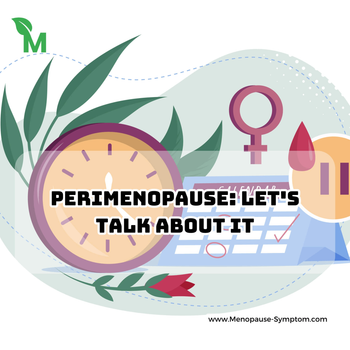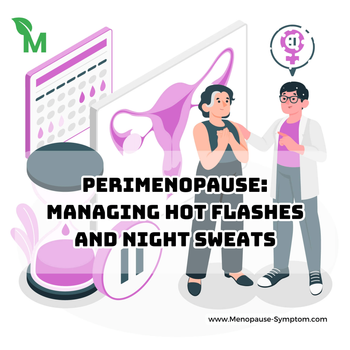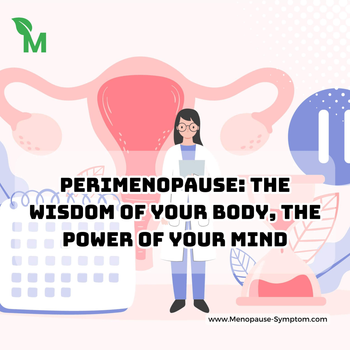Not only is it a natural physiological process, perimenopause also brings challenges in daily life, especially sleepless nights.
Perimenopause: Physiological and Psychological Changes
When entering the perimenopause stage, a woman's body undergoes major hormonal changes - notably a decrease in estrogen. This can lead to symptoms such as hot flashes, night sweats and especially insomnia. Perimenopause not only affects a woman's physical health but also her psychology. However, it is important to remember that you are not alone in this journey.
Insomnia
Insomnia is a common sleep disorder. People with insomnia have difficulty falling asleep, staying asleep, or both. Acute insomnia is short-term difficulty sleeping. Chronic insomnia is when your sleep problems last for 4 weeks or longer.
Many women experience insomnia during perimenopause. According to research, about 30-60% of women experience insufficient or disrupted sleep during this period. This can cause anxiety, stress, and feelings of loneliness. But in reality, many other people are experiencing similar symptoms. Understanding that you are not alone can help reduce the feeling of isolation during this process.
Uncomfortable Symptoms of Perimenopause
Insomnia is one of the most common symptoms of perimenopause. Many women report not only difficulty falling asleep, but also frequent waking in the middle of the night and not being able to get back to sleep. These symptoms can be caused by a lack of estrogen, which disrupts your natural sleep cycle. If you are experiencing sleepless nights, know that you are not alone and there are many ways to cope.
Solution for Sleepless Nights
Change Your Lifestyle: Your lifestyle can have a big impact on the quality of your sleep. Make sure you have a regular sleep schedule, avoid staying up late, and limit your caffeine and alcohol intake.
Exercise Regularly: Exercise is not only good for your physical health, but it is also a great way to improve your sleep. Try gentle exercises like yoga or an evening walk.
Practice Relaxation Techniques: Learn relaxation techniques like meditation, deep breathing, or listening to calming music to help relieve stress before bed.
Consult a Professional: If your insomnia persists, don’t hesitate to seek help from your doctor or a sleep specialist. They can provide advice or methods that are appropriate and effective.
Improve Sleep Quality
The Centers for Disease Control and Prevention (CDC, USA) recommends that adults aged from 18 to 60 need at least 7 hours of sleep each night. However, most people do not get enough sleep.
In addition to the above solutions, it is also important to learn about foods and herbs that can help you during perimenopause. Some studies show that supplementing foods rich in omega-3, vitamin D and magnesium can help improve sleep quality.
Community Connection
When you feel alone in your perimenopause journey, remember that connecting with others is important. Joining a support group or online forum where you can share and learn from others’ experiences can provide a sense of companionship.
Coping Through Perimenopause
Perimenopause can be a huge challenge, but it is also an opportunity to evaluate your life, take care of yourself, and make time for the things that matter. There are many other women going through similar feelings. By sharing and empathizing, you can find ways to improve your quality of life during this time.
Find Natural Solutions
Some women choose to seek natural solutions through herbs and supplements to support the perimenopause process. Herbs such as valerian, dong quai, or flaxseed may help improve symptoms. However, you should consult your doctor before using it to ensure safety and effectiveness.
Psychological Health
Insomnia can often cause obesity, cardiovascular problems, susceptibility to cardiovascular diseases, and psychological disorders such as anxiety and depression. Recognize your emotions and do not hesitate to seek support from a psychologist if needed. Keeping your mind balanced will not only improve your sleep but also help you feel more comfortable during perimenopause.
Conclusion: The Common Journey
Perimenopause, with all the changes it brings, can be a big challenge. But remember that you are not alone in this journey. Many other women are going through similar feelings and challenges. Together, we can share knowledge, experiences and find ways to overcome perimenopause healthily and confidently. Always take care of yourself, seek support from your community, and enjoy every moment of your life.
Key Points:
Perimenopause and sleep: Changes in estrogen levels during perimenopause can disrupt sleep patterns and lead to insomnia.
Impact of insomnia: Sleepless nights can contribute to anxiety, stress, and feelings of isolation.
Prevalence: Up to 60% of women experience sleep problems during perimenopause.
Symptoms: Difficulty falling asleep, frequent night waking, and trouble getting back to sleep.
Coping strategies:
· Lifestyle changes: Maintaining a regular sleep schedule, exercising regularly, limiting caffeine and alcohol intake.
· Relaxation techniques: Meditation, deep breathing, and calming music before bed.
· Seeking professional support: Doctors or sleep specialists can offer guidance and treatments.
· Dietary changes: Consider foods rich in omega-3, vitamin D, and magnesium.
· Community support: Joining online forums or support groups can provide comfort and connection.
Source: Team MPS compiled, analyzed and wrote. Please dont reup without source. Many thanks.

Perimenopause: Let's Talk About It
09.02.2024
Perimenopause is a natural transition in a woman's life, marking the end of her menstrual cycle and the beginning of a new chapter. While many people are still shy about talking about perimenopause, the truth is that being open and understanding about it can bring peace of mind and confidence.

Perimenopause: Managing Hot Flashes And Night Sweats
09.02.2024
Perimenopause is a natural stage in a woman's life, usually starting around age 40 to 50. This is when the body begins to experience hormonal changes, leading to a variety of uncomfortable symptoms, the most prominent of which are hot flashes and night sweats.

Perimenopause: The Wisdom Of Your Body, The Power Of Your Mind
Invalid Date
Perimenopause marks a new and exciting chapter in a woman's life. It is not only a time when the body undergoes dramatic hormonal changes, but also an opportunity for women to rediscover themselves, become familiar with new abilities, and develop the inner strength of their minds.
